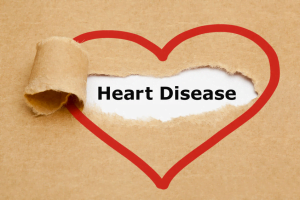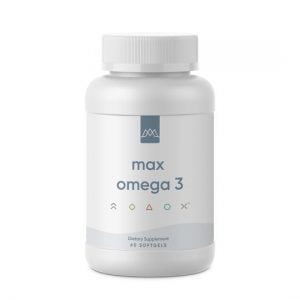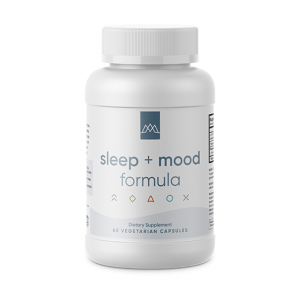 Heart disease often offers warning signs, including chest pain, shortness of breath, and pressure or tightness in the chest. [1][2]
Heart disease often offers warning signs, including chest pain, shortness of breath, and pressure or tightness in the chest. [1][2]
High blood pressure, unhealthy cholesterol levels, and obesity are major risk factors that can lead to heart disease. Driving these and other risk factors is chronic inflammation, which Time Magazine called “The Secret Killer.”
Chronic inflammation is slow and lingering, and can stay silent for months or even years before its deadly manifestations occur. Chronic inflammation plays a pivotal but sometimes overlooked role in the development and progression of cardiovascular diseases. [3] Among its damage, this type of inflammation can:
- Irritate your blood vessels
- Promote the growth of plaque
- Loosen plaque in your arteries
- Trigger blood clots [4]
Inflammation Isn’t Always Bad
When you cut your finger, your immune system releases white blood cells to protect and heal that cut. During this process, you may experience redness, warmth, swelling, or even pain. This type of inflammation, called acute inflammation, is healthy and occasionally lifesaving.
This inflammation should do its job and calm down on its own. When it doesn’t – when the inflammation response stays fired up when the body no longer needs it – chronic inflammation can result. [5]
The number of diseases associated with chronic inflammation has increased over the past few decades. Three out of every five people die due to chronic inflammatory diseases, including obesity, diabetes, and heart disorders. [6] In America today, heart disease is the leading cause of death. [7]
The good news is that with the right nutrition approach, you can lower the inflammation that contributes to these risk factors that, left unchecked, may lead to heart disease. [8]
Reduce Inflammation: Add More Wild-Caught Seafood
 To support heart health and lower inflammation, you need to first eliminate the interferences that contribute to heart disease. That starts with your diet, by removing:
To support heart health and lower inflammation, you need to first eliminate the interferences that contribute to heart disease. That starts with your diet, by removing:
- Sugary processed foods
- Vegetable oils and margarines which are high in inflammatory fats
- Fried foods[9]
Replace these inflammatory foods with healthy, whole foods that naturally lower inflammation and help the body heal naturally. Wild-caught seafood is one of the best choices, thanks to its high amounts of the omega-3 fatty acids eicosapentaenoic acid (EPA) and docosahexaenoic acid (DHA).
Researchers learned about the benefits of fish for heart health in the 1970s, when they noted the health of the Inuit in Greenland, who ate large amounts of seafood every day. As a result, their risk of heart attack was 10 times lower than the Danes in the same region. Those and subsequent studies sparked interest in the potential of omega-3 fatty acids to prevent cardiovascular diseases.[10]
More and more subsequent studies confirmed the benefits of omega-3 fatty acids for heart health. Studies show, for instance, that EPA and DHA can reduce the high triglycerides, which are a risk factor for heart disease. [11]
Omega-3 Fatty Acid Supplements Can Help Reduce Inflammation
The American Heart Association recommends eating two 3.5-ounce servings of non-fried fish every week. We’ve got plenty of delicious recipes to help increase your intake, such as our Salmon Veracruz.
Unfortunately, most Americans don’t eat enough fish.[12] That’s where using an omega-3 fatty acid supplement can help. Among its heart-supporting benefits, omega-3 fatty acids can help:
- Stabilize cell membranes
- Reduce cardiac arrhythmias, conditions that cause the heart too slowly, quickly, or erratically
- Lower inflammation
- Reduce blood pressure
- Lower triglyceride levels
- Prevent the formation of fatty plaque in arteries [13]
 One review of 13 trials involving a total of 127,477 participants found that supplementing with omega-3 fatty acids significantly lowered risk for most heart problems, including:
One review of 13 trials involving a total of 127,477 participants found that supplementing with omega-3 fatty acids significantly lowered risk for most heart problems, including:
- Heart attacks
- Coronary heart disease death
- Total coronary heart disease
- Cardiovascular disease death
- Total cardiovascular disease
In these studies, higher doses of omega-3 fatty acids showed greater heart-related benefits. [14]
Max Omega 3 makes getting those heart-healthy omega-3 fatty acids easy. Each softgel contains a therapeutic blend 300 mg of EPA and 200 mg of DHA. Max Omega 3 provides therapeutic amounts of these critical anti-inflammatory omega-3 fatty acids, in the highest-quality supplement available, to support heart health and much more.
5 More Ways to Lower Inflammation
 Many drugs used for heart disease, such as statins, have an anti-inflammatory effect. [15] While these drugs may be necessary under certain conditions, the body has the ability to heal itself with the right approach.
Many drugs used for heart disease, such as statins, have an anti-inflammatory effect. [15] While these drugs may be necessary under certain conditions, the body has the ability to heal itself with the right approach.
When you remove the interferences that create inflammation and provide the support your body needs to thrive, you dramatically reduce your risk of heart disease and other chronic inflammatory conditions.
 Along with omega-3 fatty acids, these five strategies can lower inflammation levels to support a healthy heart and more.
Along with omega-3 fatty acids, these five strategies can lower inflammation levels to support a healthy heart and more.
- Increase anti-inflammatory foods. Many of the foods on our Core and Advanced Plans naturally lower inflammation. Here’s a delicious, easy way to start your day: upgrade our Green Apple Smoothie with anti-inflammatory turmeric and ginger. Learn more foods to lower inflammation here.
- Quit smoking. Nothing good comes from smoking cigarettes. Carbon monoxide and other substances in tobacco smoke can increase atherosclerosis, an inflammatory disease that blocks blood flow and leads to heart disease. Heart health improves relatively soon after you quit smoking. After one year of kicking the habit, you half your risk of heart disease. [16]
- Find and maintain your ideal weight. Excess fat tissue can increase the chronic inflammation that leads to heart disease. Supporting your ideal weight can help lower inflammation and reduce your risk of chronic inflammatory diseases. [17] A well-designed keto diet is a great way to lose weight and maintain a healthy weight.
- Manage stress levels. Chronic stress creates or worsens many inflammatory diseases, including heart disease. [18] Stress may also lead to unhealthy food choices, which can increase the risk of disease. You can’t eliminate stress, but you can learn to better manage it. Here are 16 ways to do that.
- Get better sleep. A healthy heart depends on eight hours of solid, uninterrupted sleep every night. Sleep loss can increase inflammation. Sleep disturbances – conditions such as insomnia but also poor sleep quality – can increase several markers of inflammation.[19] If you have trouble falling or staying asleep, take our Sleep + Mood Formula.
About the Author
 Jason Boehm is a Chicago, IL-based nutritionist and science writer. He combines his two Master’s Degrees in Mass Communication and Nutrition to help others achieve their wellness goals through science-based, engaging written content.
Jason Boehm is a Chicago, IL-based nutritionist and science writer. He combines his two Master’s Degrees in Mass Communication and Nutrition to help others achieve their wellness goals through science-based, engaging written content.
References
[1] https://www.mayoclinic.org/diseases-conditions/heart-disease/symptoms-causes/syc-20353118
[2] http://content.time.com/time/covers/0,16641,20040223,00.html
[3] https://www.ncbi.nlm.nih.gov/pmc/articles/PMC6719998/
[4] https://www.hopkinsmedicine.org/health/wellness-and-prevention/fight-inflammation-to-help-prevent-heart-disease
[5] https://www.health.harvard.edu/staying-healthy/understanding-acute-and-chronic-inflammation#
[6] https://www.ncbi.nlm.nih.gov/books/NBK493173/
[7] https://www.cdc.gov/heartdisease/facts.htm
[8] https://www.ncbi.nlm.nih.gov/pmc/articles/PMC6320919/
[9] https://www.health.harvard.edu/staying-healthy/foods-that-fight-inflammation
[10] https://www.ncbi.nlm.nih.gov/pmc/articles/PMC3279313/
[11] https://pubmed.ncbi.nlm.nih.gov/20699674/
[12] https://www.heart.org/en/news/2018/05/25/eating-fish-twice-a-week-reduces-heart-stroke-risk
[13] https://pubmed.ncbi.nlm.nih.gov/19568180/
[14] https://www.ncbi.nlm.nih.gov/pmc/articles/PMC6806028/
[15] https://pubmed.ncbi.nlm.nih.gov/25037581/
[16] https://www.uofmhealth.org/health-library/hw79682#
[17] https://www.ncbi.nlm.nih.gov/pmc/articles/PMC5507106/


